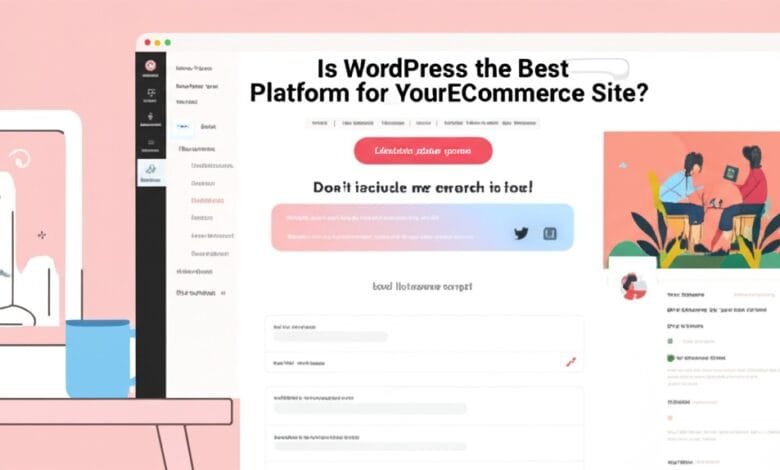Is WordPress the Best Platform for Your eCommerce Site?

▼ Summary
– WordPress with WooCommerce offers flexibility, customization, and full ownership, making it ideal for those who want control over their eCommerce site.
– It is cost-effective, with free core software and plugins, though additional costs for hosting, premium themes, and plugins may arise.
– The platform benefits from a massive ecosystem and community, providing abundant resources and support.
– Users must handle technical maintenance, security, and updates, which can be challenging for beginners.
– Alternatives like Shopify and BigCommerce offer easier setup and maintenance but with less customization and higher ongoing costs.
Whether WordPress is the best platform for your eCommerce site depends entirely on your specific needs, budget, technical expertise, and business goals. It’s a very popular and powerful option, particularly when paired with the WooCommerce plugin, but it’s not automatically the top choice for everyone.
Here’s a breakdown of the pros and cons to help you decide:
Pros of Using WordPress (with WooCommerce) for eCommerce
- Flexibility and Customization: This is arguably WordPress’s biggest strength. Being open-source, you have almost limitless control over design and functionality. Thousands of themes and plugins (including WooCommerce itself and its many extensions) allow you to tailor your store precisely to your needs.
- Cost-Effective: The core WordPress software and the basic WooCommerce plugin are free. While you’ll need to pay for web hosting, a domain name, and potentially premium themes or plugins, the initial and ongoing costs can often be lower than subscription-based platforms, especially since WordPress/WooCommerce doesn’t charge transaction fees on top of what your payment processor charges.
- Full Ownership and Control: You own your website and all its data. You’re not tied to a specific platform’s rules or potential price increases, giving you complete control over your business operations.
- Massive Ecosystem and Community: You benefit from a vast global community of users and developers. This means abundant resources, tutorials, forums for support, and a wide availability of developers if you need custom work.
- Scalability: WordPress/WooCommerce can scale from small shops to large enterprises. With the right hosting and optimization, it can handle significant traffic and product catalogs.
- SEO-Friendly: WordPress is inherently strong for Search Engine Optimization (SEO). Its structure, clean code, and powerful SEO plugins (like Yoast SEO or Rank Math) give you excellent control over optimizing your store for search engines.
- Content Integration: WordPress excels at content management. It’s easy to integrate a blog, landing pages, and other content marketing efforts directly alongside your store.
- Wide Payment Gateway Support: WooCommerce supports a vast array of payment gateways, often more than other platforms.
Cons of Using WordPress (with WooCommerce) for eCommerce
- Learning Curve: While user-friendly for content, setting up and managing a full eCommerce store involves more technical aspects than all-in-one hosted platforms like Shopify. There’s a steeper learning curve, especially for beginners.
- Maintenance Responsibility: You are responsible for all technical maintenance, including updates (WordPress core, themes, plugins), backups, and security. This requires time and diligence. Falling behind on updates can create security risks.
- Security Concerns: Because it’s so popular and open-source, WordPress is a common target for hackers. Security is your responsibility, requiring proactive measures like security plugins, strong passwords, and regular updates. Poorly coded or outdated plugins are a major source of vulnerabilities.
- Reliance on Plugins: Core eCommerce functionality comes from plugins (primarily WooCommerce). While powerful, relying heavily on multiple plugins can sometimes lead to conflicts or performance issues if not managed carefully. Some essential features might require purchasing paid extensions.
- Performance Optimization: Ensuring fast loading times requires attention to hosting quality, image optimization, caching, and choosing plugins wisely. A poorly optimized WordPress store can become slow.
- Potential Hidden Costs: While the software can be free, costs for good hosting, premium themes, essential premium plugins, and potentially developer assistance can add up over time.
WordPress vs. Alternatives (like Shopify, BigCommerce)
- Shopify/BigCommerce: These are dedicated, hosted eCommerce platforms.
- Pros: Much easier setup, faster launch time, handle hosting/security/updates/backups for you, integrated features, dedicated 24/7 support. Often better for beginners or those who want less technical hassle.
- Cons: Less customization flexibility (especially code-level), monthly subscription fees, potential transaction fees (especially if not using their native payment processor), less control over platform changes.
- Squarespace/Wix: Website builders with integrated eCommerce.
- Pros: Very user-friendly drag-and-drop interfaces, good design templates, all-in-one solution.
- Cons: Generally less powerful eCommerce features and less scalable than WooCommerce or Shopify/BigCommerce, more limited customization.
Conclusion
WordPress (with WooCommerce) is an excellent choice if:
- You want maximum flexibility and customization.
- You want full ownership and control over your store and data.
- You have some technical comfort or are willing to learn/hire help.
- You want potentially lower long-term costs (especially avoiding platform transaction fees).
- Content marketing (like blogging) is a major part of your strategy.
It might not be the best choice if:
- You prioritize ease of use and speed of setup above all else.
- You have limited technical skills and want minimal maintenance responsibility.
- You prefer predictable monthly costs and built-in support.
- You don’t need deep customization beyond what standard themes offer.
Ultimately, evaluate your budget, technical resources, need for customization, and long-term goals to determine if WordPress is the right fit for your eCommerce venture.




